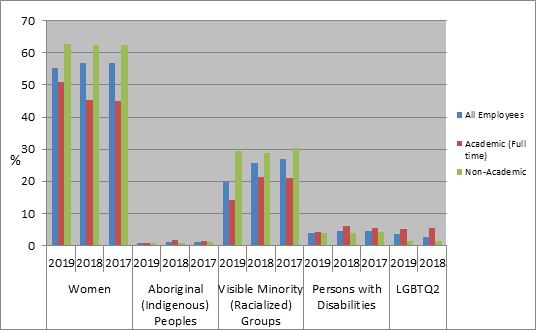York has released its Annual Employment Equity report for 2019, which charts the representation among university staff under five separate groups. The represented groups are: Indigenous Peoples, women, visible minorities (racialized groups), persons with disabilities, and members LGBTQ2+ community.
The most recent Employment Equity report for York presented that 55.2 per cent of the employees at the university are women, which showcases stability in numbers when compared to past years. The report also shows that the averages of both Indigenous employees (0.7 per cent) and employees with disabilities (four percent) were lower than their respective external availability figures.
In addition to the detailing of hiring inclusivity within the university, the Employment Equity report also outlines the strides made in the offered social and educational Equity, Diversity and Inclusion programs, such as the #YUBelong’s campaign and York’s work alongside the Canada Research Chairs Program.
“York is committed to recognizing and respecting the mutual support and reciprocity that exists between the university and the community,” Sheila Cote-Meek, vice-president of Equity, People & Culture explains. “Recognizing York in an anchor role requires an institutional outlook that extends beyond solely serving ourselves, but one that requires the institution to also hold the interested of the surrounding communities as our own”
Cote-Meek further explains that there must be a shared responsibility when it comes to inclusivity in our community.
“York takes this obligation seriously and will continue to bring forward initiatives, programs, and education that help create a more equitable university experience for all. The university is actively engaged in identifying and implementing additional new strategies to ensure our employment practices are inclusive.”
Jaskarn Duhra, York Federation of Students’ vice-president of Campus Life contends that York could be doing more in regards to its equity practices among staff and its inclusive hiring.
“The university lacks greatly when it comes to a diverse representation within its staff and faculty. As York prides itself on social justice and diversity, the goal is to see this reflected in their hiring processes. From lobbying efforts both from students, staff, and faculty, it is clear that we all see a need for better representation in York’s staff hires from the work or lack of that the university is currently doing on this issue.”
Duhra clarifies the importance of “hiring inclusively,” stating: “Hiring inclusively through an equitable lens means being able to acknowledge the systems of power that have continued to discriminate against marginalized bodies within the employment and hiring processes, and addressing it through the means of equitable hiring practices — which is not shown through the shamefully low numbers in the 2019 Employment Equity Report. Equitable hiring would mean a high representation of marginalized bodies within the workplace.”
“York’s Indigenous Framework also calls for an increase in Indigenous faculty, and from an equity perspective, it will help create welcoming conditions for Indigenous students and assist with transforming the institutions for all students.”
Both Cote-Meek and Duhra have inquired into York’s next steps in regards to future equitable employment opportunities. Cote-Meek demonstrates how York has been listening to feedback from its community, and utilizing that in their strides for equity among staff.
“For example, we have heard from many community members that increasing the number of Black faculty members is critical in addressing the issue of underrepresentation, so York has been working to increase the representation of Black faculty members and ensuring diverse applicant pools in our complement searches. York has hired 14 new Black faculty members over the past two years and is currently working on hiring 14 new Black faculty members over the next hiring cycle.”
“In addition,” Cote-Meek continues, “York’s Indigenous Framework also calls for an increase in Indigenous faculty, and from an equity perspective, it will help create welcoming conditions for Indigenous students and assist with transforming the institutions for all students.”
Duhra points out that York must prioritize inclusive hiring, drawing attention to instances of discrimination on their campuses. “The university must begin to eliminate the inequality shown through the shockingly low number of BIPOC and LGBTQA+ faculty and staff by immediately hiring people within such marginalized communities.
“We as the York Federation of Students (YFS) have made demands, in addition to supporting demands from the York University Faculty Association, that support equitable hiring including mandatory anti-oppression and mental health training for all staff and faculty, and the increased hiring of marginalized identities. The inactions of the university have shown inequitable hiring and spaces that are not equitable, safe, or inclusive for students.”
Regarding the 2019 Annual Employment Equity Statistical Report, Cote-Meek states that it “sets a benchmark to measure progress and shows us that although we are making progress.”
“There is more work to be done to ensure the university addresses the areas of under-representation,” she adds.
The full 2019 Employment Equity Report can be accessed here.


